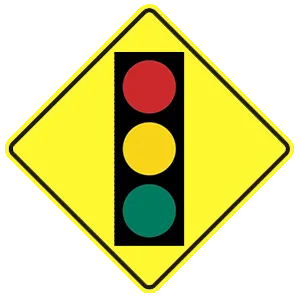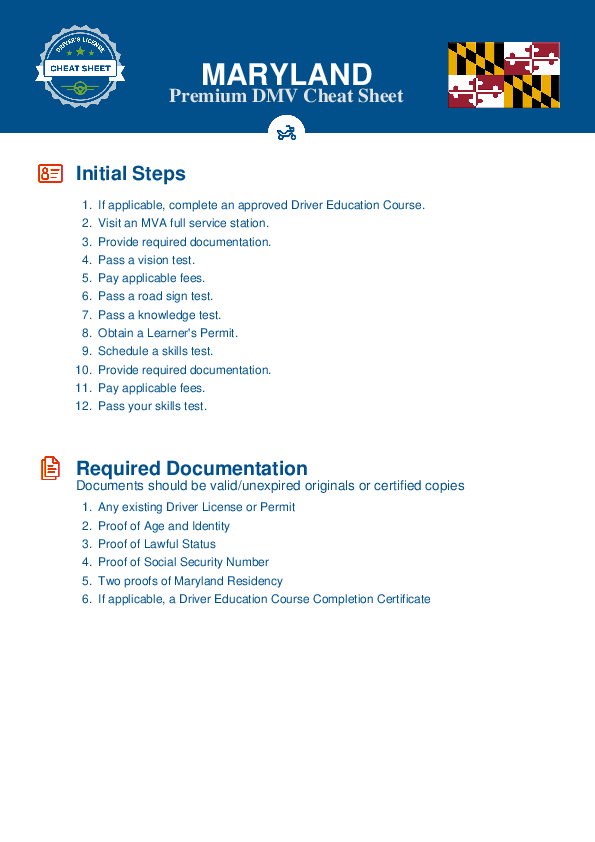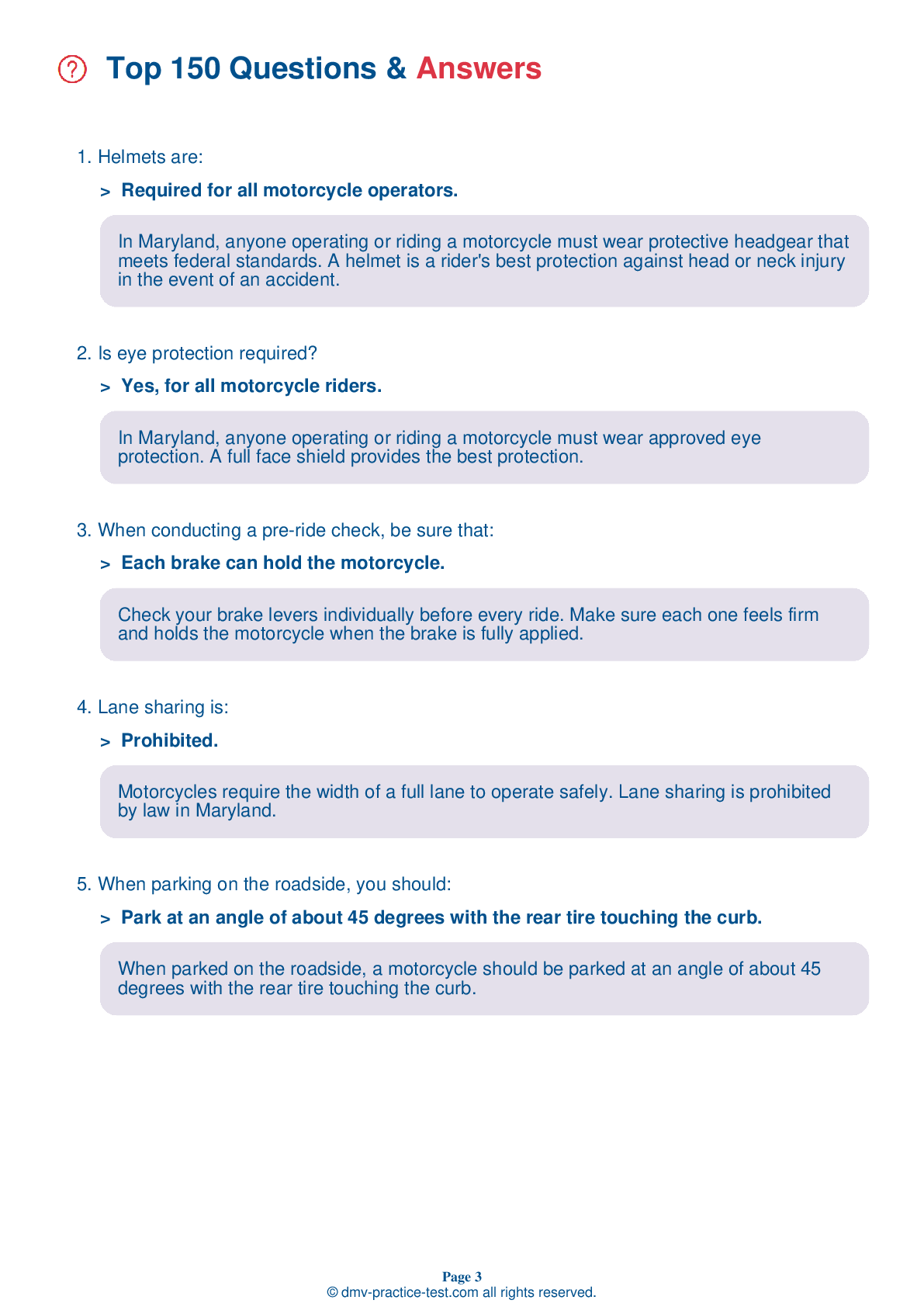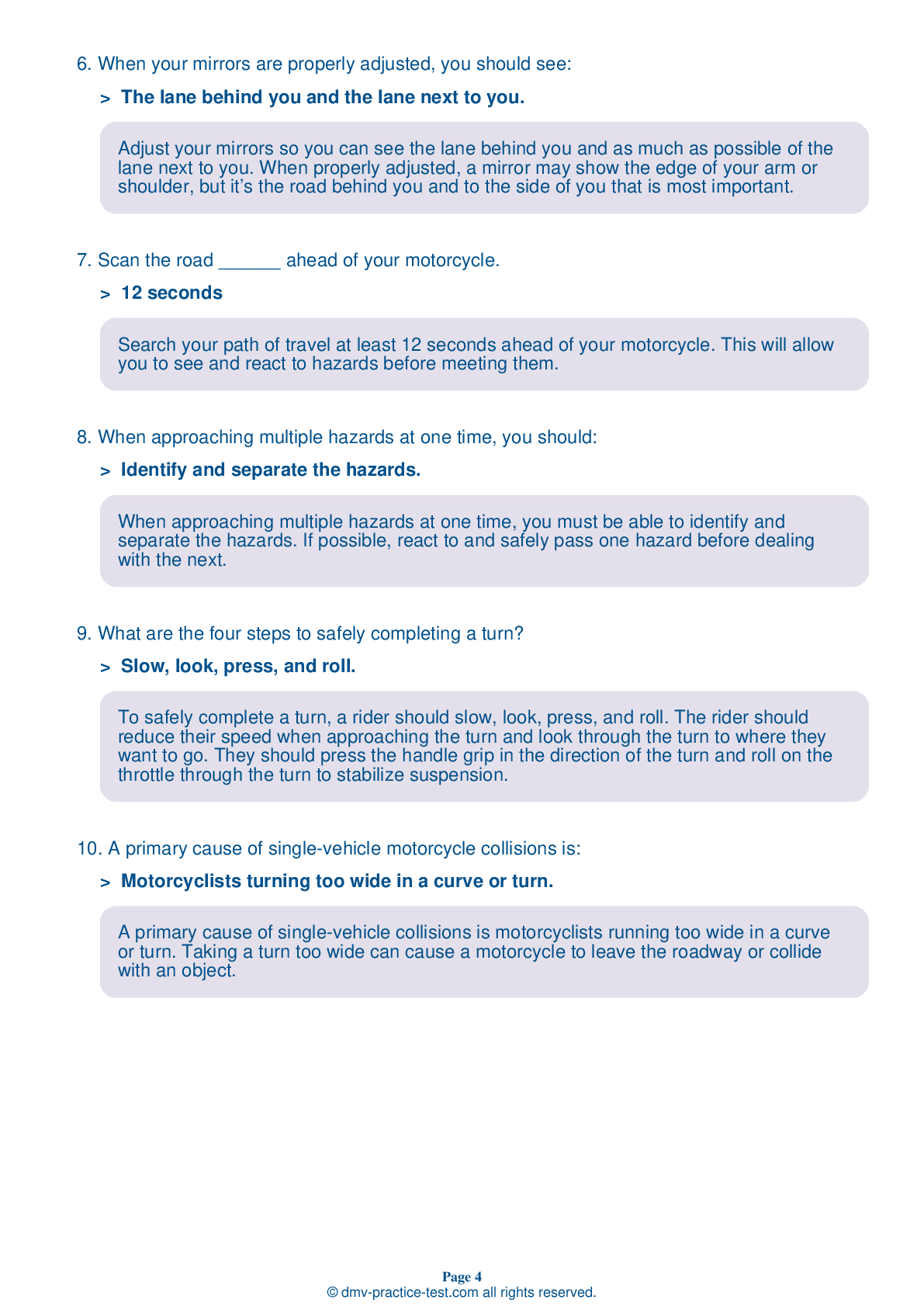DMV Permit Test #2
Motorcycle Test | License MD 2026 | FREE Online Practice! #2 Page 3 of 4
Take this FREE motorcycle test (license in MD 2026) to check your knowledge of the road rules. To improve your results, download a motorcycle handbook online, study theory, and practice for free on our website. Still worried about how to get a motorcycle license in Maryland in 2026? Check our website for more sample tests, train as much as possible, and boost your grades!
25
21
16
13 . Which of the following is a reason for ending the motorcycle skills test?
The applicant follows instructions.
During a motorcycle skills test, the examiner is required to end the test if you fall off of or drop the motorcycle (for a two-wheeler), excessively tip or lose control (for a three-wheeler), stall the engine at least four times, commit an unsafe act, disregard instructions, violate a traffic regulation, or accumulate enough points to fail the test.
15 . It is important to flash your brake light when:
Your signals are not working.
Motorcycle brake lights are more difficult to see than the brake lights of larger vehicles, so flashing your brake light may help other drivers to notice it. You should flash you brake light before slowing down where other drivers may not expect you to slow down, such as in the middle of a block or when approaching an alley.
16 . Generally, the body eliminates how many alcoholic drinks per hour?
Four
On average, a person's body can eliminate the alcohol content of about one drink per hour. The amount of time required to lower a person's blood alcohol content (BAC) can vary, so it is safest not to operate any motor vehicle after consuming any amount of alcohol.
17 . A wobble, or shaking of the front wheel and handlebars, may be caused by:
Excessive wind.
Most wobbles are caused by improper loading of the motorcycle, unsuitable accessories, or incorrect tire pressure.
18 . To receive maximum protection, wear a helmet that is certified by the:
National Association of Helmets.
To get maximum protection, use a motorcycle helmet that meets U.S. Department of Transportation (DOT) standards.
Need Motorcycle Insurance? No problem!
Compare the best rates in Maryland and find a personalized policy that meets your needs.
1. Are You Currently insured ?
2. Married ?
3. Do you own your Home?
4. Have you or a Family Member Honorably Served in U.S. Military ?
5. Your Name
6. Age
7. Zip code
Ranked by best match
2026 Maryland | Frequently Asked Questions
To acquire a motorcycle license in Maryland, you must first obtain a Class M motorcycle learner's permit by passing a vision test and knowledge test at a Maryland MVA office. After this, you must complete the Maryland Motorcycle Safety Program's Basic Rider Course. Upon successful completion, you can then apply for a full Class M license at the MVA.
In Maryland, the minimum age for obtaining a motorcycle driver's license is 16 years and 6 months. However, if you're under 18, you must complete the Maryland Motorcycle Safety Program's Basic Rider Course. Additionally, minors need to have their parent's or guardian's consent and should have held a learner's permit for at least 9 months.
Yes, in Maryland, you need a separate, specific license to operate a motorcycle, known as a motorcycle endorsement. This is in addition to a standard driver's license. It requires passing a written exam and a skills test. The process ensures that motorcycle riders have the necessary skills and knowledge for safe operation.
To apply for a motorcycle driver's license in Maryland, you'll need to provide proof of identity (like a birth certificate or passport), proof of Social Security (like a Social Security card or W-2 form), and two proofs of Maryland residency (like utility bills or bank statements). You'll also need to pass vision and knowledge tests, and complete a motorcycle safety course.
Yes, to obtain a motorcycle license in Maryland, you will need to pass a written exam. This exam tests your knowledge of motorcycle operation, traffic laws, and safe riding techniques. However, if you complete a Maryland Motorcycle Safety Program course, the written and skills test may be waived. Always check with the Maryland Motor Vehicle Administration for current requirements.
The written motorcycle test in Maryland covers a variety of subjects related to motorcycle safety and operation. These include traffic laws, road signs, safe riding techniques, handling dangerous situations, and the effects of alcohol and drugs on riding. The test is based on the information contained in the Maryland Motorcycle Operator Manual.
No, in Maryland, you cannot substitute the written test with a motorcycle training course. The training course can waive the skills test but not the written one. The written test is mandatory to ensure that you understand traffic laws, road signs, and safe riding techniques before you get your motorcycle license.
To enroll in a motorcycle training course in Maryland, first find a Motor Vehicle Administration (MVA) approved course provider. You can do this online or by calling the MVA. Once you've chosen a provider, contact them directly to enroll. Some providers allow online enrollment, while others may require you to call or visit in person. Fees and schedules vary by provider.
No, you don't have to own the motorcycle used for the license test in Maryland. The motorcycle can be borrowed but it must be registered, insured, and pass all safety standards. However, unless you have a valid motorcycle learner's permit, a licensed motorcycle operator must bring the bike to the test site.
Yes, you can use a friend's motorcycle for the Maryland motorcycle license test, provided it's registered, insured, and meets safety standards. However, you must have a valid motorcycle learner's permit or a licensed motorcycle operator must bring the bike to the test site for you. Always check with your local Motor Vehicle Administration office for specific rules.
Yes, in Maryland, the motorcycle driving exam tests specific handling skills. These include ability to start and stop, turn and swerve, quick stop, obstacle swerve, and cone weave. The test is designed to assess your ability to control the motorcycle under various circumstances, ensuring safety on the road.
Yes, in Maryland, new motorcycle drivers under the age of 18 are required to complete a Basic Rider Course. They also have a provisional license period, which includes restrictions like no passengers, no driving between midnight and 5 am, and zero alcohol tolerance. These restrictions are lifted after 18 months of clean driving record.
Yes, your Maryland motorcycle license is valid across the United States. It allows you to legally operate a motorcycle in all other states. However, you must observe the traffic laws of the state you are in, as they may differ from those in Maryland. Always check local regulations when traveling to unfamiliar areas.
Yes, it is mandatory to wear a helmet when operating a motorcycle in Maryland. According to Maryland's law, all motorcycle drivers and passengers are required to wear a helmet that meets the safety standards set by the U.S. Department of Transportation. Additionally, eye protection is required unless the motorcycle is equipped with a windscreen.
Yes, Maryland offers two types of motorcycle licenses: Class M and Class M with a J restriction. A Class M license allows you to operate any motorcycle. A Class M license with a J restriction is for mopeds and motor scooters only. The type of license you need depends on the type of motorcycle you intend to drive.
Yes, in Maryland, you can add supplementary endorsements to your motorcycle license. Endorsements allow for the operation of different types of vehicles such as motorcycles, school buses, and commercial vehicles. To add an endorsement, you typically need to pass both a written test and a skills test related to the specific type of vehicle.
Yes, it is possible to take the motorcycle license test in Maryland in various languages other than English. The Maryland Motor Vehicle Administration (MVA) offers the test in languages like Spanish, Korean, French, etc. However, you should contact your local MVA office beforehand to check the availability of your preferred language.
An effective strategy to prepare for the motorcycle license test in Maryland is to study the Maryland Motorcycle Operator Manual thoroughly. It covers all topics that will be on the test. Additionally, taking practice tests online can be beneficial as they simulate the actual exam environment, helping you understand the format and type of questions asked.
Yes, the motorcycle written test in Maryland can be taken in several languages other than English. The Maryland Motor Vehicle Administration (MVA) offers the test in Spanish, Korean, French, and more. However, it's recommended to contact your local MVA office ahead of time to confirm the availability of your preferred language.
If you don't pass the motorcycle written test in Maryland, you will be allowed to retake it. However, you must wait at least one day before your next attempt. If you fail the test three times, you'll be required to wait 7 days before retaking it. You must also pay a re-examination fee each time.




